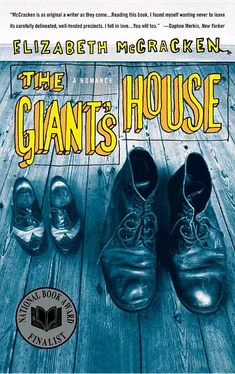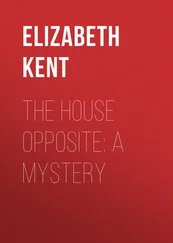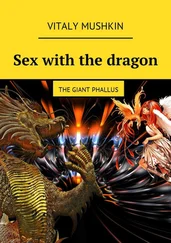No profit to this thinking , I told myself, so stop it . I could not lift the sheet. What was I doing? That’s right, waiting for the men from the funeral home, better get ready. This place needs dusting, I thought, and I opened the top right desk drawer, where I kept a cloth. I dusted the sashes of the windows, the roses Oscar had painted; I spat on the cloth and rubbed at a stubborn spot.
I had my back to him. Can I tell you something? It wasn’t so bad. Not so bad at all right then, me scowling at the dirt, James in his bed, the way it always always was. Look, if that’s all that happened, if his dying just meant that I would be waiting for him to say something instead of listening to him say something, it would have been fine.
But then Oscar arrived. He walked to me, took the cloth from my hand. And still, if he hadn’t said anything I could have gone on and got the cottage ready for whoever would come by to visit.
“Peggy,” he said, his voice not up to even these dumb syllables. It was Oscar’s breathy bad voice that made dusting seem like the wrong thing to be doing. “Let’s wait somewhere else,” he said. “Let’s not stay here.” And he put his arm around me, dropped the cloth to the floor, and led me to the front house.
Caroline had Alice on her lap, Alice had a book on hers. They weren’t looking at the book. The neighbor we’d called came in carrying coffee.
“Oh!” she said, when she saw me. She hoisted the pot. “Would you like some?”
I shook my head.
“I’m making cookies,” she said. She was alternately smiling and looking grief-stricken, not sure what her role in all this was. “I mean, I’m about to.” She was a nice woman, wearing one of Caroline’s gingham aprons. She stuck her hand in its heart-shaped pocket. “Maybe Alice would like to help me.”
“Maybe,” said Caroline. But she didn’t look like she wanted to let go of her daughter anytime soon.
“Cookies,” said Oscar. He sat down on the sofa and patted the cushion next to him. I sat down.
“This isn’t right,” I said to him.
“No. Of course not.”
“No,” I said. “We should be doing something.”
“There’s nothing to do, Peggy.”
“There’s something.” I rubbed my hands on my knees. And then he took my hands in his and held them in such a way I could believe he needed them, that I was being useful, lending Oscar my hands.
Is it possible that I knew all along that he’d die, that he’d be taken away from me, and that’s why I’d loved him? I don’t mean in any selfless way, but in the most selfish, the way that so many of us — we unhappy, I mean — want only to assure ourselves and the world that our unhappiness is justified and real. This is why the dying are so easy to love: it’s a magician’s trick, a paper vase with an invisible sleeve. Did I love him because I knew this moment would come, when James, who I’d poured my love into, would be gone, because I knew my love, my pourable love, was limited, and if I’d decanted it into someone whose prognosis was better I would have run out by our fifteenth anniversary (is that tin? paper? steel?) and would have then become the bitter empty person everyone knew I was destined to be, only with the company of my unfortunate husband?
Maybe I’d loved him because I knew he’d leave me. Maybe, once. It wasn’t worth it.

We hadn’t explained things to the funeral home, and they’d sent over a regular-sized hearse. “My God,” the driver said. “ This is who it is?” He folded his arms across his chest. “No way. No way to do this.”
“Yes, there is,” I said. And they seemed to believe me. With Oscar’s help they lifted him to the back of the hearse, tied the doors shut.
“We’ll take him to the hospital—” one man started.
“What?” said Oscar. “Why? Is he—”
“No,” the guy said, and then, more gently, “No. But we need to get him declared dead by a doctor.” And they drove down the street, neighbors watching from their porches, and took James away from us.
I stood there, waiting for him to sit up, part the pleated curtains of the back window. Those curtains looked like coffin lining — why did the dead need so many folds of fabric, so much luxurious privacy, everywhere they traveled? I waited for him to wave at me. He didn’t, of course. I went back to the cottage and made his bed. I crawled into it for a second, wanting warmth. But it had been hours since anything warm had been in that bed, the sheets were cold, and I did not want to be the one to warm them.
What killed him was an infection caused by a brace rubbing his leg, the sore spot so far away from his brain he never felt it at all. This is not poetic fancy, but fact: the news from his leg was never delivered. He hadn’t noticed that he’d lost feeling that far up. Neither had we.
He was just three months past twenty, eight foot seven inches, four hundred and fifteen pounds.
There were other things to do. Funeral arrangements, for instance. Caroline took charge of that. He needed two burial plots. There was money — James’s circus money — to buy them, but the ones for sale were by themselves, away from family. Caroline and Oscar donated theirs, by James’s fat nephritic grandmother and limping arthritic grandfather. With the money they bought themselves a spot in the new part of the cemetery, knowing they would eventually have each other for company.
The funeral was attended by neighbors, reporters, friends, even the real estate brokers who saw him fall. Stella came up from Maryland with her husband and, incredibly, a baby, plump and pink-cheeked and pretty like her mother. I did not talk to her, nor to the reporters, not even to Caroline and Oscar. They had asked me to sit in the front with them — wasn’t I family? Didn’t I know by now I was? — but I said my heart couldn’t take that. “The front of a church is not the front of a roller coaster, Peggy,” Caroline said gently, “it’s going to be bad no matter where you sit.” I thought differently. A stranger might have concluded that I worked for the church or the funeral home, standing as I did at the door welcoming people, handing out programs; sitting as I did at the back, by myself, so I could see what was going on; comforting, as I did, some old lady who didn’t even know him but had shown up after seeing the obit in the paper. “He was so young,” she said, sobbing into my shoulder, “so young, and such an unhappy life. God is strange. God is good, but God is strange.”
For the second time, James made Time ’s “Milestones” column.
He left a will, of sorts. Any money in the bank was to stay there for Alice’s education. The cottage belonged to Oscar and Caroline; only sensible, since it stood on their property. Anything else — letters, paintings, books — was left to me. I could do what I wanted with them, though he hoped I would consider requests from friends who wanted souvenirs. He’d underlined the word friends . Dr. Calloway called from Illinois, wanting to buy some things. “I have quite a collection of memorabilia, and I’d be interested in adding some of James’s effects,” he said.
“Dr. Calloway?” I said. “Doctor? Go to hell.” He hung up on me immediately; I knew he was that sort of man.

You seem to be taking all of this very well , somebody said to me. I don’t remember who it was. That person was wrong, although I didn’t know it then. I was taking it the worst possible way.
I believed then that the thought James is dead would be the key that swung open my heart and then broke off in the lock. It would ruin me. I believed I was making a choice. I could carry on, I could do my work and think of him and iron my clothes in the morning; or I could become so wrecked by grief that I wandered the streets, my fingers stuck in my hair and my hair stuck in my mouth, strangers running from me as I said, wait a minute, I only want to tell you about somebody . I thought these were the only two paths before me, that they diverged so wildly that, as I stepped onto the sensible ordered path, my lifelong choice, I would not see or think of the other path again; it would lead to another neighborhood entirely. I did not know that walking on one, I would be always in sight of the other; that they crossed one another sooner rather than later; and then crossed each other again, and again.
Читать дальше













